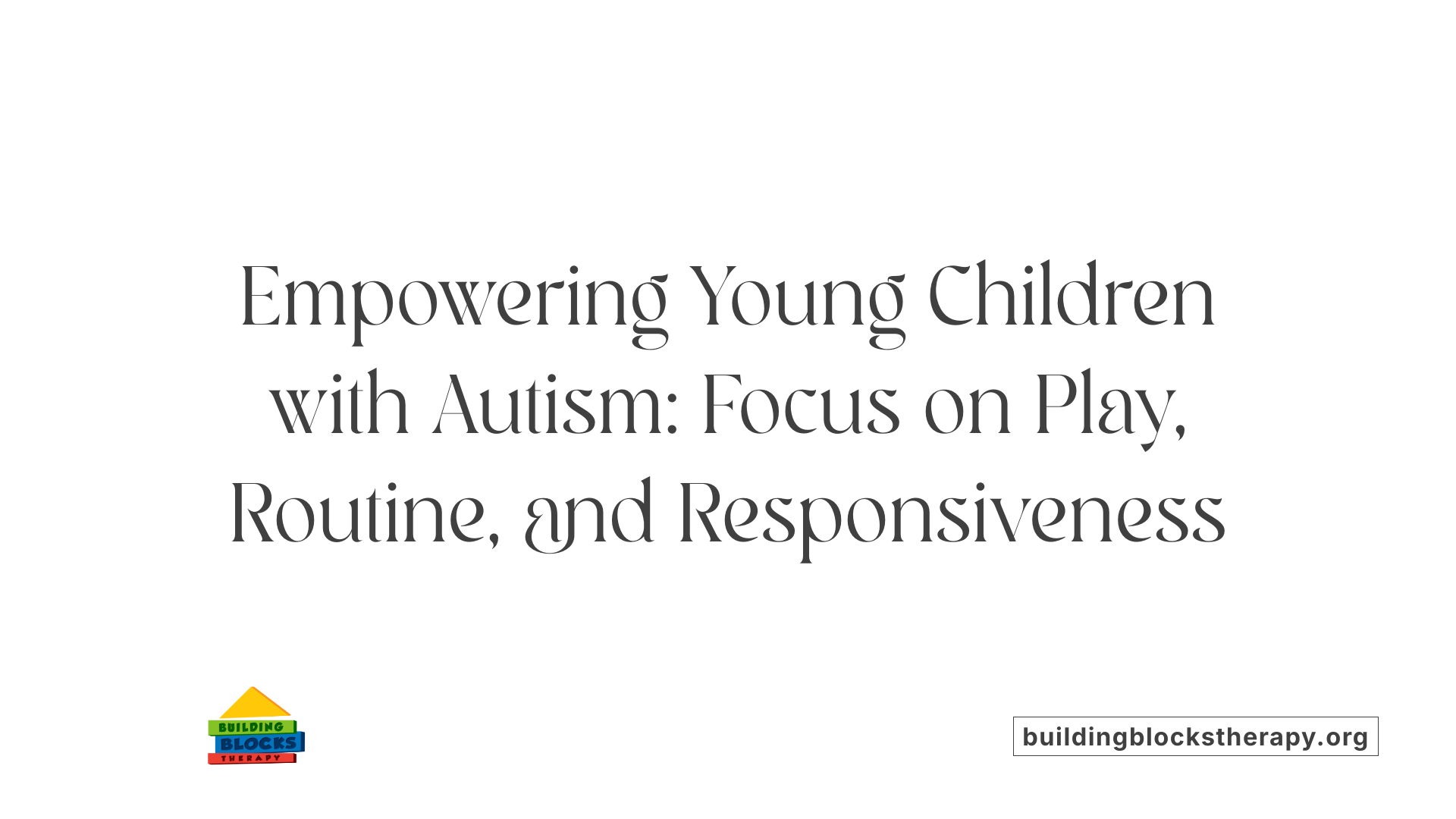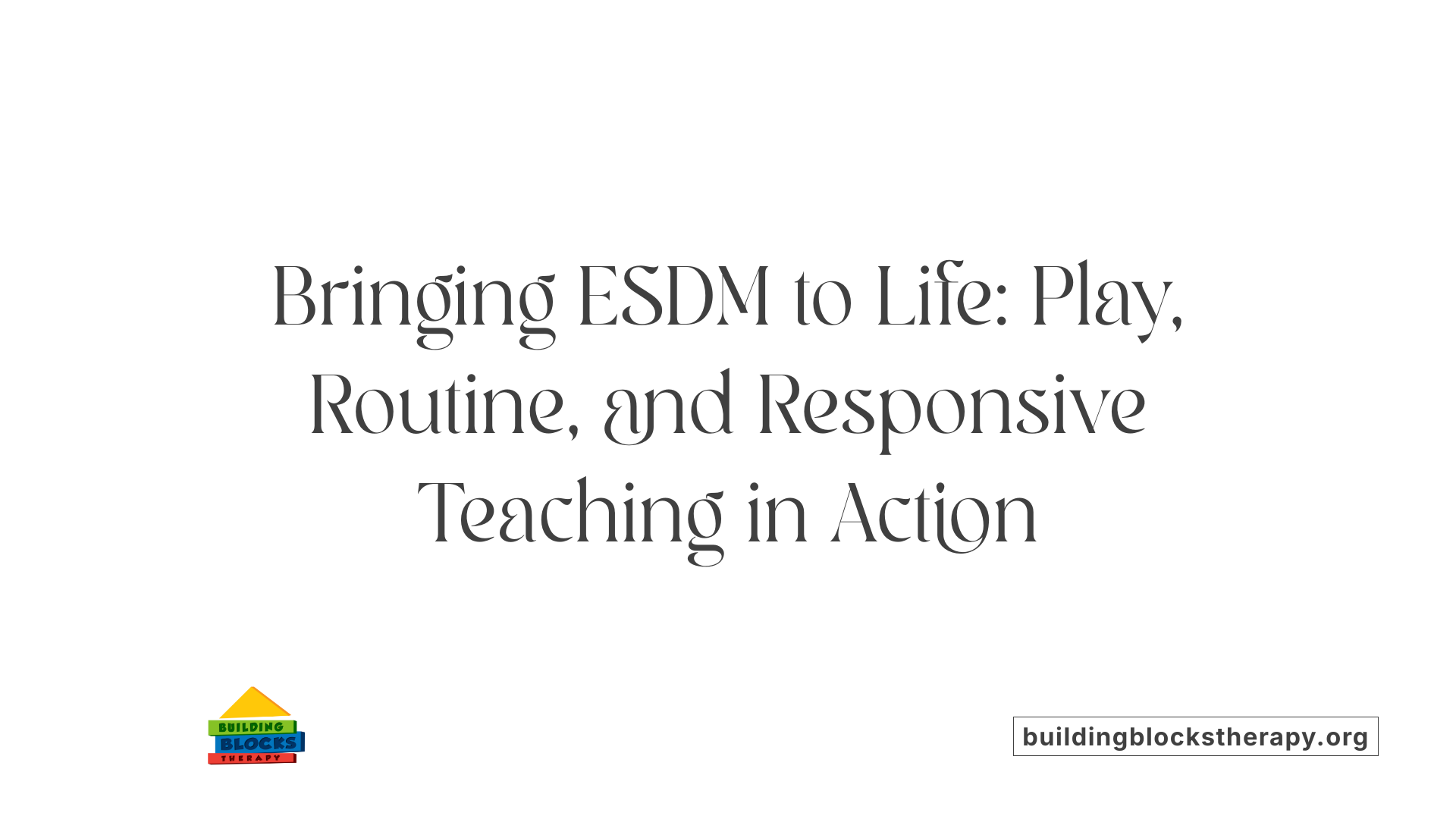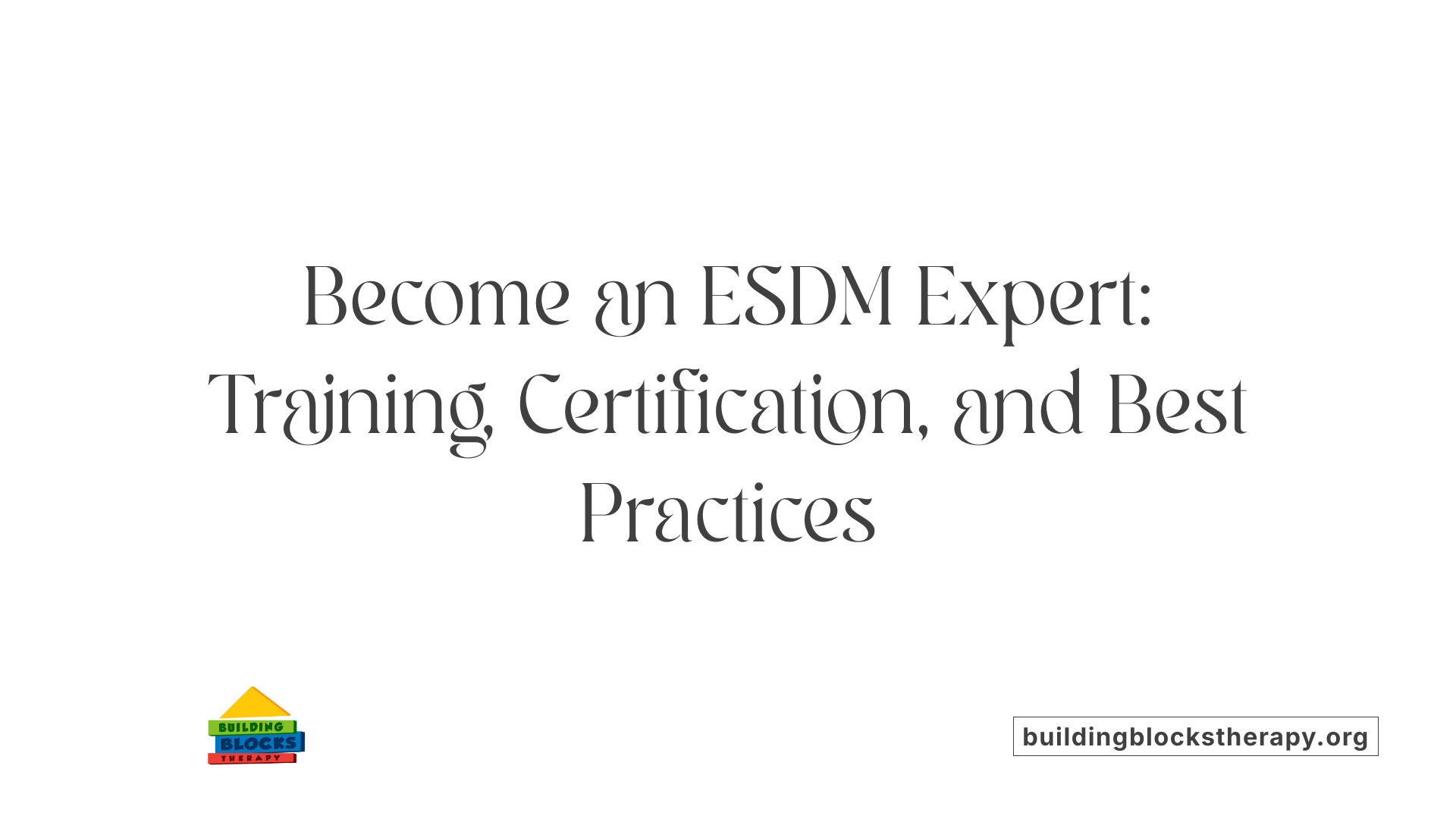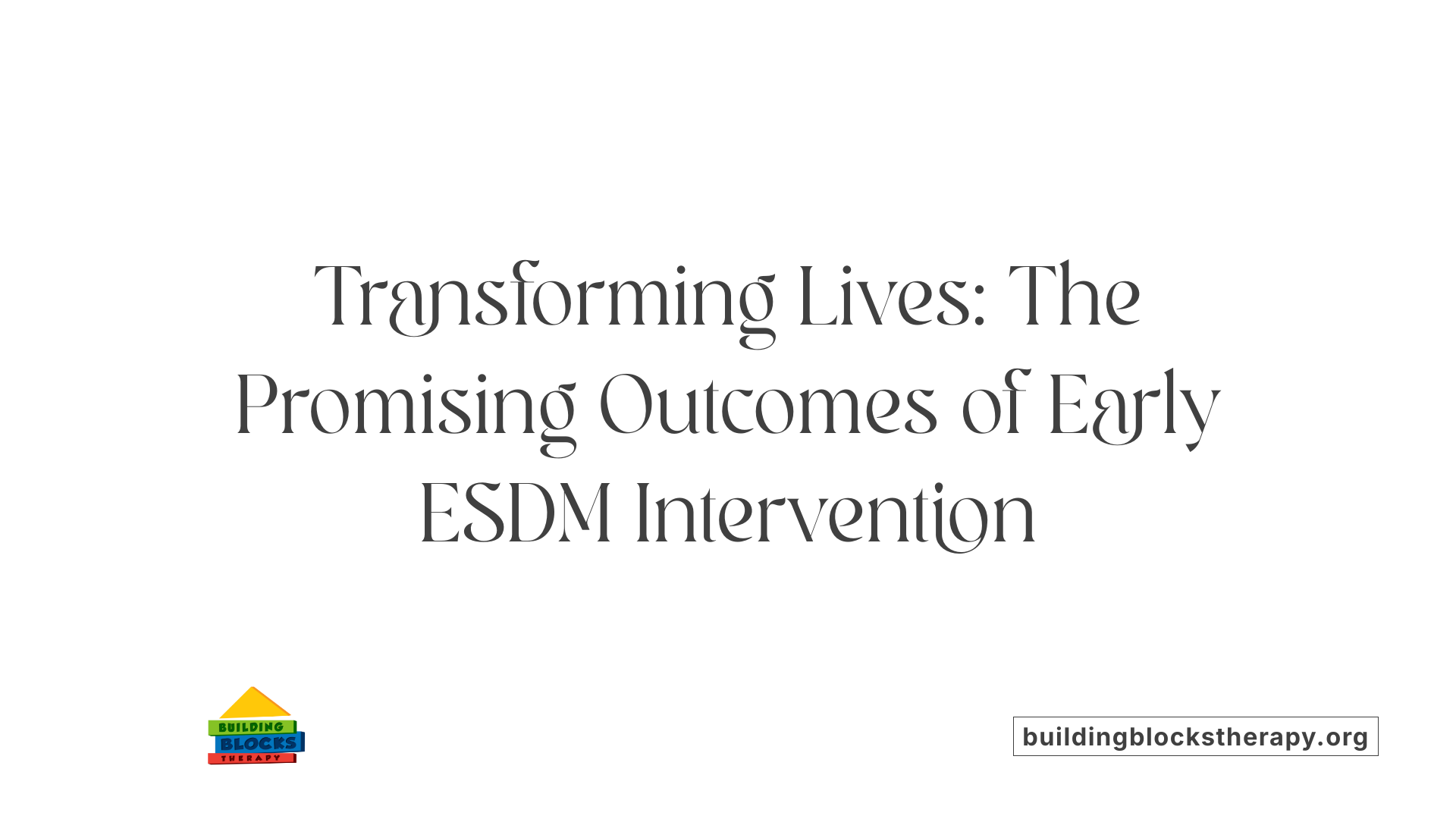Introduction to ESDM: A Pioneering Approach
The Early Start Denver Model (ESDM) is an innovative, evidence-based early intervention program specifically designed for children with autism spectrum disorder (ASD) between the ages of 12 and 48 months. Developed through collaborative efforts by Dr. Sally Rogers and Dr. Geraldine Dawson, this therapy uniquely combines developmental science with applied behavior analysis (ABA) principles to foster social, cognitive, and communication skills through natural, play-based activities. Emphasizing relationship-building, the ESDM's core philosophy revolves around creating engaging, positive interactions that support both learning and emotional development during early childhood, a critical period for neuroplasticity and skill acquisition.
Core Principles and Philosophy

What is the Early Start Denver Model (ESDM) and its core principles?
The Early Start Denver Model (ESDM) is a proven early intervention approach designed specifically for children between 12 and 48 months who have autism spectrum disorder (ASD). It combines developmental principles with relationship-focused strategies rooted in applied behavior analysis (ABA). The core idea is to foster children’s social, communication, cognitive, and play skills through engaging, naturalistic activities.
One of the fundamental principles of ESDM is its emphasis on building positive relationships. Therapists and parents work together to create a supportive environment where the child feels secure and motivated to learn. The approach prioritizes understanding a child's typical developmental sequence and tailoring activities to support their individual growth.
Activities are play-based and occur within daily routines, making learning natural and enjoyable rather than separate from everyday life. This means using activities like pretend play, storytime, singing, or snack time to teach communication and social skills in context.
Implementation involves not only trained professionals but also parents, who are taught strategies to embed into their daily interactions. Sessions can take place at home, in clinics, or in preschool settings, allowing flexibility and consistency.
Research consistently shows that ESDM reduces core autism symptoms and promotes gains in language, social interaction, and cognition. Its holistic, relationship-driven, and individualized approach makes it a highly effective early intervention for very young children with ASD.
Application and Implementation Methods
 The Early Start Denver Model (ESDM) is used in various settings to support children with autism, including at home, in clinics, and in educational environments like preschools or daycare centers. Its flexible approach allows therapists and parents to adapt activities based on the child's daily routines and natural interests.
The Early Start Denver Model (ESDM) is used in various settings to support children with autism, including at home, in clinics, and in educational environments like preschools or daycare centers. Its flexible approach allows therapists and parents to adapt activities based on the child's daily routines and natural interests.
In therapy sessions, ESDM employs play, routines, and social interactions to promote development in language, social, and cognitive skills. Activities such as pretend play, building blocks, storytelling, singing, sensory play, social games, and outdoor activities serve as natural opportunities for learning.
Professionals delivering ESDM—such as psychologists, occupational therapists, speech-language pathologists, and early intervention specialists—play specific roles. They assess the child's strengths and needs, then design individualized programs that focus on fostering engagement and responsiveness. Caregivers are actively involved, learning techniques to incorporate into daily routines, which enhances skill generalization outside of therapy sessions.
The methods used include modeling, prompting, and reinforcement to encourage desired behaviors. For instance, therapists or parents might model a communication gesture or word, prompt the child to imitate, and then provide positive reinforcement like praise or a preferred activity.
Progress is carefully monitored through data collection during each session. Therapists and parents track specific behaviors and skills, often using standardized checklists such as the Curriculum Checklist. Regular reviews—typically every 12 weeks—help evaluate progress, adjust goals, and ensure that interventions are effectively supporting the child's development.
Overall, the combination of play-based activities, routines, and responsive teaching strategies, supported by ongoing assessment, makes ESDM a flexible and evidence-based approach for early autism intervention.
Evidence of Effectiveness and Scientific Support
Research supporting the effectiveness of the Early Start Denver Model (ESDM) is substantial and diverse. Multiple high-quality studies, including randomized controlled trials (RCTs) and meta-analyses, have consistently found positive outcomes for children undergoing ESDM. For instance, a landmark RCT in the United States demonstrated significant improvements in language skills, social communication, and cognitive development following two years of ESDM therapy. In addition, systematic reviews of these trials highlight that children receiving ESDM tend to show notable gains in receptive and expressive language, as well as better adaptive behaviors.
Neuroimaging studies further support the success of ESDM by revealing changes in brain activity associated with social and communication functions. Brain scans have shown increased neural engagement in areas governing social cognition, suggesting that ESDM promotes neurodevelopmental progress at the brain level.
The intervention’s feasibility across different settings—such as clinics, at home, and in community environments—has also been documented. Trained therapists and parents can effectively implement ESDM in diverse contexts, making it a flexible option for families.
While existing evidence strongly supports ESDM’s benefits, experts emphasize the importance of ongoing research. Many studies face methodological limitations, and independent replications are necessary to solidify the evidence base. Nonetheless, current data indicates that ESDM is a promising approach capable of substantially benefiting children with autism by improving their communication, social interaction, and cognitive skills.
| Evidence Type | Main Findings | Settings Covered | Additional Notes |
|---|---|---|---|
| Randomized Controlled Trials | Significant language, social, and cognitive gains | Clinics, homes, community | Two-year studies show lasting improvements |
| Meta-Analyses | Confirm positive effects across multiple studies | Various | Support for overall efficacy, though some limitations exist |
| Neuroimaging Studies | Brain activity changes in social/communication areas | Research labs | Indicate neuroplasticity and developmental impact |
| Feasibility and Implementation | Effective in diverse real-world settings | Community, home, clinics | Can be adapted for different environments and provider types |
Training, Qualifications, and Delivery of Providers

What qualifications and roles do providers need to deliver ESDM?
Therapists and professionals who deliver the Early Start Denver Model (ESDM) must have specialized training and certification in the intervention. This ensures they are equipped with the necessary skills to implement evidence-based strategies effectively.
Certification process in ESDM
To become certified, providers typically complete a series of training sessions, including an introductory workshop and advanced training. The introductory workshop is often self-paced, online, and not monitored by an instructor. Successful completion is required before progressing to advanced training.
Advanced certification involves submitting videotaped sessions demonstrating mastery of ESDM techniques. These videos are reviewed by certified trainers to assess implementation fidelity. The process ensures practitioners can deliver interventions that adhere strictly to the program’s standards.
Roles of psychologists, behavior analysts, therapists
Qualified ESDM providers include psychologists, behavior specialists like Board Certified Behavior Analysts (BCBA), occupational therapists, speech and language pathologists, early intervention specialists, and developmental pediatricians. All these professionals must complete specific ESDM training and certification processes.
Their roles typically involve conducting assessments, planning individualized intervention programs, coaching parents, and implementing play-based sessions that promote language, social, and cognitive development in children.
Parental and caregiver training
Parents and caregivers play a vital role in ESDM. Certified providers often include parent training as an essential component, coaching caregivers on how to incorporate strategies into daily routines and play activities. This approach helps generalize learned skills and fosters stronger parent-child relationships.
Training sessions for parents may involve workshops, video modules, and ongoing coaching, enabling them to actively participate in their child's developmental progress.
Standards for effective delivery
Effective ESDM delivery requires adherence to high standards of training, supervision, and fidelity to the model. Certified providers undergo ongoing supervision and participate in fidelity assessments to maintain quality.
Moreover, effective programs involve continuous progress monitoring, collaboration with families, and tailoring activities to each child’s unique needs. Sites like the Autism Speaks Directory or UC Davis Mind Institute list certified therapists who meet these standards.
In summary, delivering ESDM effectively relies on qualified professionals with specialized training and certification, ongoing supervision, and active parental involvement. This structured approach helps maximize developmental gains and supports young children with autism in various settings.
Benefits, Outcomes, and Resources

What are the benefits and outcomes associated with the Early Start Denver Model in autism therapy?
The Early Start Denver Model (ESDM) provides a range of positive results for young children diagnosed with autism spectrum disorder (ASD). Extensive research demonstrates that children undergoing ESDM show marked improvements in language, social skills, and cognitive development. For instance, studies report increases in IQ scores—some showing an average boost of over 17 points over two years—and enhancements in daily living skills such as self-help and motor abilities.
In addition to cognitive gains, ESDM encourages children to participate actively in therapy sessions, fostering imitation, attention, and social engagement. This naturalistic, play-based approach leverages everyday routines and enjoyable activities—like singing, storytelling, and pretend play—to motivate children and build meaningful relationships.
Some children experience reductions in the severity of autism symptoms, with many moving toward milder diagnoses. The therapy not only addresses core social communication deficits but also promotes general developmental progress, setting a strong foundation for future learning and life skills. Overall, ESDM results in improved developmental trajectories, equipping children with the skills necessary for better long-term outcomes.
Are there opportunities to train in ESDM and access resources?
Parents, therapists, and educators interested in implementing ESDM can access a variety of training workshops and educational materials. Online introductory workshops, available through institutions like Duke University and other certified providers, guide participants through core principles and practical strategies.
Professional support is essential, with certifications available after completing structured training programs, including workshops, practice cases, and video assessments. Certification ensures that providers deliver high-quality, fidelity-supported interventions.
Various organizations facilitate access to resources and trained therapists. Autism Speaks maintains a directory of certified providers, while the UC Davis MIND Institute offers a list of specialists trained in ESDM. Additionally, comprehensive manuals such as
Summary and Future Directions
The Early Start Denver Model stands out as a comprehensive, evidence-based approach to early autism intervention, emphasizing naturalistic, relationship-driven teaching that actively involves parents and caregivers. Its demonstrated effectiveness in improving communication, social skills, and cognitive development underscores its value as a primary intervention during the formative years. As research continues to evolve, ongoing studies aim to refine the methodology, expand community access, and establish long-term outcomes. Widespread provider training and resource development are crucial to ensuring that this promising approach reaches more children globally, ultimately shaping more positive futures for children with autism.
References
- Early Start Denver Model (ESDM)
- Early Start Denver Model | ESDM Training Program | Autism ...
- Partnering for Autism: Learning more to improve Services ...
- Early Start Denver Model
- The Early Start Denver Model in the Duke Autism Clinic
- Early Start Denver Model - Foundations
- Early Start Denver Model: autism therapy






